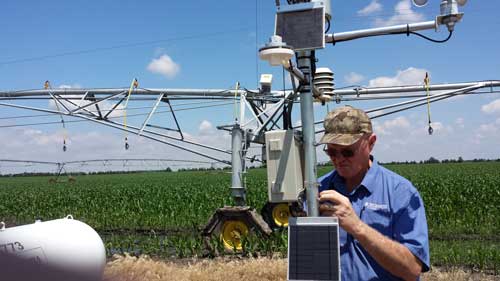-
PRODUCTS
-
Differential Pressure Flow Meters V-Cone
VM V-Cone
Wafer Cone
Exact Steam
Connected Solutions FlowConnect
McCrometer Connect
Smart Output
SmartTrax
Electromagnetic Flow Meters FPI Mag
MCMAG 2000
MCMAG 3000
SPI Mag
ULTRA Mag
Dura Mag
Oil & Gas Series Field Mag 3000
Field Mag 5000
Electromagnetic Flow Meter Electronics ProComm
ProComm GO
Propeller Flow Meters FS100 Flow Straightener
FS200 Flow Straightener
McPropeller
Water Specialties.
-
Differential Pressure Flow Meters V-Cone
- INDUSTRIES
- RESOURCES
- BLOG
- SUPPORT
Know the Flow
By Ken Quandt
This article originally appeared in Irrigation Today on November 1st, 2019.
http://www.modernpubsonline.com/0A406ys/ITFall2019/html/index.html?page=12&origin=reader
Flow meters don’t immediately come to mind when growers think of tools and technology they’re looking to implement on their farms. It’s not a new Kubota tractor, it’s not the newest app designed for agriculture, it’s not state-of-the-art harvesting equipment. In fact, some growers only hear about flow meters when they’re instructed by regulatory bodies to implement them.
Growers who aren’t mandated to use flow meters, and even those that are, may be unaware of the amount of data they’re missing out on. Flow measurement is advancing in technology and has joined the agtech revolution, the interconnected ecosystem of smart devices and products used to provide growers with important, insightful data about their farming operations.

Flow measurement and monitoring, while important for overall natural resource sustainment and conservation, is an additional tool in the agtech toolbelt contributing to growers’ abilities to make informed decisions about their bottom line.
Leak-o-nomics
Meters are often perceived as a regulatory device and not necessarily as a conservation or management tool. Water management and conservation start with the meter. Once water is measured, it can be measured in inches per acre just like other inputs such as fertilizer per acre or the number of seeds per acre.
As all farmers are aware, every input in a farm’s operation has a cost tied to it, whether it’s seed, fertilizer, tillage, or water. Flow measurement has a holistic economic component that can be often overlooked. Irrigation has a cost, and not just in water pumping. The cost to pump the water includes the electricity or the internal combustion engines that pump water through irrigation systems which affect growers’ bottom lines. Overwatering can result in an economic loss of pumping costs as well as a loss of nutrients in the soil that can be mobile with water.
A well’s flow can fluctuate, and its constant flow can’t be relied upon for precision irrigation. Using a flow meter can help troubleshoot potential problems. For example, hydraulic problems can arise when the water table is drawn down in the local aquifer as a result of groundwater depletion. In this case, the well does not have enough water in the aquifer to meet the original design of the pump.
In these types of situations when an irrigation system doesn’t perform to its greatest capacity, that’s where a meter provides an advantage. The irrigation flow meter isn’t just used for irrigation management, but it is also a diagnostic tool to ensure the irrigation system is performing according to the way it was designed. Metering provides constant data to help diagnose irrigation system problems when they occur.
Quality Assurance
It’s no secret that margins are tight in agriculture, and that growers are looking at every input into their production process. Water metering can assist in managing environmental factors that affect growing, like soil irrigation. Wet conditions can affect crops and even potentially leach nutrients out of the soil.
The interconnectivity of flow meters has become a real asset to growers, providing them with a plethora of data that can help inform them of their crop conditions. Flow meters with a telemetry component provide ease of use for collecting meter readings, and that digital feature fits into the world of agtech and precision agriculture. Having that data in the palm of your hand, and connected with other data like weather conditions, soil moisture, pesticide and fertilizer application, and more can lessen the challenges facing growers attempting to achieve a high crop yield.
In a regulatory environment, meters help growers stay within their water allocation. However, in addition to that, metering has so many benefits for farmers, helping them stay informed about the resources, natural and economic, that go into crop production.
The Future of Metering
Many geographic areas of the country are mandating metering for water resource concerns, and some are in the process of developing water management plans. Whether mandated or not, growers have many options as it relates to flow measurement, depending on the application of the meter and their irrigation management goals. Propeller meters are the classic flow meter for agriculture, as their rugged durability and mechanical construction offer an impressive lifespan and “in-field” servicing if necessary. Electromagnetic meters, another flow technology available, have no moving parts and offer immense accuracy and application diversity, for growers experiencing dirty water applications.
First-time users should determine what their metering needs are and the kind of monitoring they expect to do. Many growers want to integrate metering into the larger network of smart farming, and benefit from telemetry registers, which automate data collection through satellite and cellular communication. Telemetry registers are a great option for many growers who juggle the various responsibilities of managing a farm, and for water districts amassing large amounts of flow data.
Choosing the right meter takes a little bit of research, and possibly some help from your irrigation dealer. There’s a lot of beneficial information to help in the decision-making process. For more information about the decision-making process for flow meters and irrigation solutions, visit www.mccrometer.com/ag
Ken Quandt is the government relations specialist for McCrometer, a global flow meter manufacturer located in Hemet.

